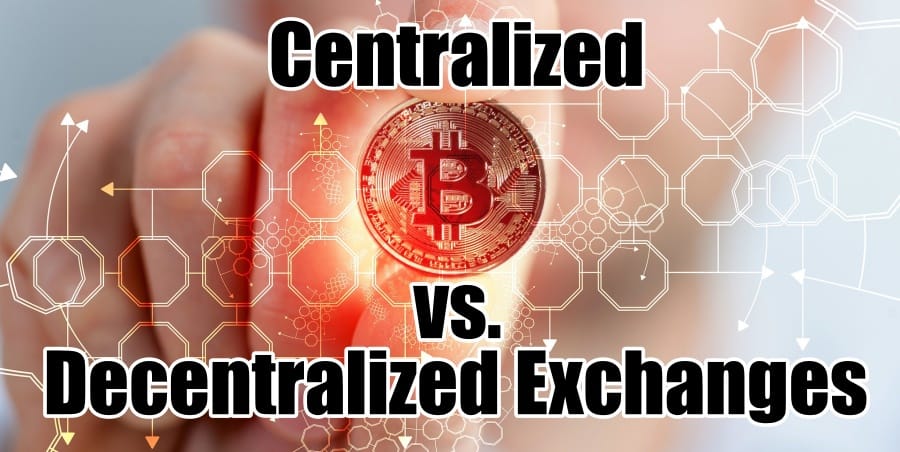Centralized vs Decentralized Exchanges
We all want our cryptocurrencies stored in a safe place where no one can access them, but we also want speed, low fees, and a variety of benefits and/or options when carrying out crypto trading, right?
Cryptocurrency exchanges emerged some time ago as a response to the needs of crypto users around the world, and they’ve evolved mainly into two types: Centralized Exchanges (CEX), and Decentralized Exchanges (DEX).
Each type has its pros and cons, and as the crypto world continues evolving, so do exchanges, and it can be quite difficult to discern which is the best choice for you among so many options available.
Insha’Allah we’ll explore the world of centralized and decentralized exchanges and learn about the differences between the two, the advantages and disadvantages of each, as well as provide a list of centralized and decentralized exchanges that are popular to use so that you can better decide what’s the best choice for you.
What is a cryptocurrency exchange?
A cryptocurrency exchange is an online platform that allows its registered users the trading of digital assets – whether crypto or fiat money – in a secure and efficient way.
The basic function of these platforms is to provide the necessary tools for users to carry out cryptocurrency trading in person-to-person (P2P) transactions.
Obviously, each exchange has its particular procedures, but in general, they all work in a similar way:
1. You sign up on the platform
Each platform will request some personal data from you, and while some exchanges ask for a large list of requirements, others will only ask for a username and email. Many exchanges may also apply “know your customer” (KYC) policies to verify the authenticity of the data you provided.
2. Fund your account
Once you’ve signed up, you can transfer money into your account whether in the form of other cryptos (Bitcoin, Ethereum, Litecoin, etc.) or fiat money (US Dollar, Malaysian Ringgit, Euro, etc.). Payment methods will vary according to the exchange, and while some will accept popular payment processors like PayPal, others won’t.
3. Perform transactions
You can then trade your currencies for another, trading from fiat to crypto or from crypto to crypto. The most popular currencies usually are Bitcoin, Ethereum, USD, and EUR.
4. Withdraw your money
You can finally withdraw the money you’ve invested, converting it to the currency you prefer. You can then withdraw to your bank account or another payment platform, depending on the exchange.
Let’s take a more in-depth look at the difference between CEX and DEX exchanges so you can better see the difference and how they work.
What is a centralized exchange or CEX?
A centralized exchange is a platform where each transaction goes through a central authority that controls all operations on the platform. The majority of exchanges today are of this type.
These exchanges usually make a profit by charging a commission for each transaction on their platform, but they may also have additional ways to generate income.
One important feature of CEX platforms is that they not only provide a means for trading, but they’re usually easy to use and many times, they also offer powerful analysis and security tools for your transactions.
On the other hand, you’ll find a greater level of security processes to follow in order to gain access to the platform, like “know your customer” (KYC) and Anti-Money Laundering (AML) policies.
What is a decentralized exchange or DEX?
In decentralized exchanges, transactions take place directly between two users. In this way, there is no need for intermediaries because the users are who establish the terms for negotiation.
You won’t find CEOs or employees here; since these platforms run based on blockchain technology, everything is controlled democratically among users.
To give you an example: in the case you want to buy a cryptocurrency like Dogecoin by paying with Bitcoin, you go to the platform and simply set an initial bid price. If someone agrees with that price, you pay with Bitcoin and receive your Dogecoins. The transaction is done.
The above is one of the main advantages of decentralized exchanges; you can quickly start making transactions on the platform because there is less regulation, so you don’t need to pass through a whole series of verifications.
However, this can also be problematic. If any problem occurs – like someone trying to scam you – the exchange won’t be able to help you because transactions are carried out person-to-person.
CENTRALIZED EXCHANGES | |
ADVANTAGES | DISADVANTAGES |
Ease of use | Less control of your money |
Many additional tools | You do not hold your private keys |
High liquidity | Less privacy |
High speed for transactions | |
Greater variety | |
Advantages of centralized exchanges
Ease of use
These platforms usually have user-friendly interfaces. This is an advantage when you’re a beginner in crypto trading.
Many additional tools
These platforms usually offer a wide variety of security and analysis tools to apply to your trading transactions.
High liquidity
CEX platforms have a higher volume of transactions usually because they may offer lower fees for transactions, custodial options, a large variety of crypto assets to trade, ease of use on their platform, and higher and security measures they must follow due to government regulation.
High speed for transactions
The algorithms CEX platforms use can process a high volume of orders per second in real-time. This can help traders react faster to unexpected market changes.
Greater variety
Due to the larger number of registered users, big exchanges can offer a greater variety of digital assets you can operate with. They also support transactions in fiat currency.
Disadvantages of centralized exchanges
Less control of your money
Crypto assets are stored on the exchange since the wallets are part of the platform. This can be pretty bad for you if a platform decides to block your funds.
You do not hold your private keys
Your private keys will remain within the exchange, so there is a risk that you could lose all your money if an attack on the exchange occurs.
Less privacy
These exchanges are regulated by the laws of the country where their companies are located. This may be useful to prevent money laundering, but on the other hand, operators might collect a large amount of personal data from you.
DECENTRALIZED EXCHANGES | |
ADVANTAGES | DISADVANTAGES |
Less regulation | Greater complexity |
More control | Lower transaction speed |
More privacy | Lower liquidity |
No fiat currency transactions | |
Benefits of decentralized exchanges
Less regulation
Decentralized exchanges are free from any type of limitation or regulation by any public or private entity. Trade between users is direct and, for the most part, you won’t see any KYC or AML procedures needed to access the platform.
More control
As a user, you’ll have full access, control, and responsibility over your private keys and your crypto assets. This means no one can steal them directly from the platform.
Also, the risk for external security threads is minimal because there is no central point to direct an attack. This also decreases the possibility of server failures.
More privacy
Since there isn’t any type of authentication procedure or loading of ID documents, your identity will remain anonymous.
Disadvantages of decentralized exchanges
Greater complexity
DEX platforms are still limited regarding a variety of functions. In addition to that, user interfaces are still pretty complex for the beginner and sometimes even the intermediate user.
Lower transaction speed
Trading on a DEX is usually slower as each transaction must be validated by other nodes (other computers). This can be a problem if you need to react quickly to changing market situations.
Lower liquidity
At present date, you’ll find most traders on centralized exchanges, as the concept of decentralization is relatively new. This means that liquidity is also lower as well as the volume of transactions.
No fiat currency transactions
Even though this is changing, the majority of DEX platforms won’t allow you to perform transactions in fiat currency because it is not part of their decentralized philosophy nor do they want to have to follow KYC and AML regulation.
Top centralized exchanges
Coinbase (This is an affiliate link)
One of the largest and most reputable CEX platforms, Coinbase offers many options for a wide variety of users. You can connect directly with your bank account, but it also supports other payment methods.
Binance
This popular platform operates with all kinds of cryptocurrencies. It’s the largest trade volume in the world and you can do everything, from trading to staking and peer-to-peer (P2P) trading.
Kraken
Kraken is with no doubt one of the most complete exchanges today. Although it’s not the best option for beginner traders, it has an impressive number of options for the expert-level trader.
Gemini
Gemini is a platform that offers a wide variety of cryptocurrencies for all types of users, whether they’re beginners or professional investors. Also, you can use it from any device and its interface is really easy to use.
KuCoin
KuCoin is a very easy to use platform, especially if you’d like to use it from your Android device. Although it doesn’t have a high volume of transactions, here you can find assets that are hard to find in other exchanges.
Bitfinex
If you’re a novice user, Bitfinex is not for you. This platform is designed for expert users, and you can see that in the wide variety of options its user interface has. On the other hand, it has high liquidity and is a platform that cares about responding to its users in case of problems.
Top decentralized exchanges
Uniswap
Uniswap is the best exchange platform in DeFi. It’s easy to use and has a large volume of transactions and liquidity. Being a DEX platform, users can vote for changes to the platform democratically. Their fees are only about 0.3% per transaction.
SushiSwap
SushiSwap is the result of fork (separation) on the UniSwap blockchain and is currently its main competitor. Today, it has $3.06 billion in guaranteed assets and also offers unique features in the DEX environment that go beyond the exchange of crypto assets.
Bancor
Bancor is a pioneering liquidity protocol in the DeFi ecosystem. It’s operated by the Swiss Bancor Foundation, has its own native token (BNT), and offers unique asset protection features for its users. It has a high credibility level.
BurgerSwap
BurgerSwap is a platform founded in 2020 and is very similar to Uniswap. It’s quite easy to use and has managed to position itself very well in the market. It currently has a liquidity volume of around $300 million. Not bad for a starting platform.
Binance DEX
This is the decentralized version of Binance. It’s powered by the Binance Coin (BNB) cryptocurrency and offers quite low fees compared to other similar exchanges. Currently, it’s a fairly solid platform that offers all the advantages of a DEX but requires overcoming a certain learning curve to get the most out of it.
Islamic perspective of CEX and DEX
Scholars in Muslim countries where cryptocurrencies are halal, such as Malaysia, recommend that crypto users buy their cryptocurrency at centralized exchanges (CEX) that are government-regulated as a means to be protected from scammers.
Muslims should also be mindful that some decentralized exchanges (DEX), as well as centralized exchanges (CEX), specialize in lending out your cryptocurrency as loans where you will earn interest off of the loan.
Since some scholars classify Bitcoin, or cryptocurrency as a whole, as currency, then those scholars say that the rules of riba al buyu apply and that it is haram to earn interest from lending out your bitcoin or cryptocurrency. And in the end, Allah knows best.
PLEASE KINDLY SHARE THIS ARTICLE IF YOU’VE FOUND BENEFIT IN IT



